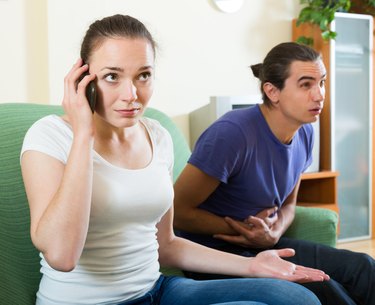
When your stomach starts grumbling after a meal, you might regret the foods you chose. While an upset stomach after a meal can have a direct correlation to what the meal contained -- such as in the case of indigestion or a foodborne illness -- a frequently upset stomach might indicate a more serious problem. Keep an eye on your symptoms and the frequency, and talk to your doctor when necessary.
Mild or Short-Term Problems
Video of the Day
Some stomach upsets have mild or short-term symptoms, which don't necessitate medical treatment. For example, indigestion -- also referred to as dyspepsia -- can cause feelings of extreme fullness after eating or burning or pain in the upper abdomen. Indigestion could be caused by a more serious medical condition, such as an ulcer or cancer, but the pain doesn't necessarily have a cause; this is known as functional dyspepsia. Foodborne illness can also cause nausea, vomiting and other stomach pain after eating, depending on which bacteria sickened you. According to the Food and Drug Administration, this illness strikes about one in six Americans per year. Although foodborne illness -- also known as food poisoning -- can be serious in young children and older adults or those with weakened immune systems, many cases pass in 48 hours.
Video of the Day
Moderate or Long-Term Issues
Although a food intolerance can manifest in many different ways, one symptom is an upset stomach. Intolerance is different than a food allergy, which is an immune response to a protein. While the symptoms of an intolerance are unpleasant, they're typically not dangerous, according to registered dietitian Tamara Duker Freuman in "U.S. News and World Report." The most common food intolerance is to lactose, a milk sugar in dairy products; however, the diagnosed cases of intolerance to gluten, a protein found in wheat, rye and barley, is growing. Avoid the symptoms by removing the food to which you're intolerant from your diet -- there is no cure for a food intolerance. Another potential cause is a peptic ulcer, an open sore in the lining of the stomach, esophagus or intestine. It's caused by bacteria known as Helicobacter pylori -- not spicy food, despite popular myth. Pain typically occurs within two to three hours of eating, reports the University of Maryland Medical Center.
Serious Concerns
It's less likely that you have stomach cancer than any other digestive problem, but one symptom is abdominal pain or a sense of fullness, particularly after eating a small meal. Don't panic, though -- this is more likely to be caused by a stomach virus than cancer, advises the American Cancer Society. If you have frequent pain after eating, as well as swelling in the abdomen, vomiting with or without blood and weight loss without trying, speak with your doctor.
Treating the Pain
For mild abdominal pain after a meal, avoid solid foods for a few hours and just sip on water or clear fluids. If you vomit, wait six hours before trying to eat bland foods and avoid dairy products, recommends MedlinePlus. Antacids could help if your feel discomfort high in your abdomen after a meal. Call your doctor if your the pain persists for a week or longer, or becomes more severe and frequent with nausea or vomiting. If you experience severe abdominal pain and you have tenderness or a rigid feeling in your stomach, have difficulty breathing or have chest, neck or shoulder pain as well, call your local emergency number.
Is this an emergency? If you are experiencing serious medical symptoms, please see the National Library of Medicine’s list of signs you need emergency medical attention or call 911.